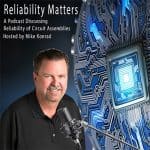
Leadership Connection Interview with Bob Fei
Since 1976, Life Cycle Engineering (LCE) has provided engineering solutions that deliver lasting results for private industry, public entities, government organizations and the U.S. military.
Your Reliability Engineering Professional Development Site
by Doug Plucknette Leave a Comment

Since 1976, Life Cycle Engineering (LCE) has provided engineering solutions that deliver lasting results for private industry, public entities, government organizations and the U.S. military.
by Dianna Deeney Leave a Comment

We have a reliability target for our system. But we’re not meeting it.
To avoid this scenario, what is something we can do in early development?
When we’re figuring out our concept, we can better learn about our options. We can work with Reliability Engineers to understand what we know, the risk in what we don’t know, and to prioritize reliability of the modules to be able to meet the reliability of our whole system.
We talk about using reliability allocation to help us choose reliability goals for modules of our product design. And we talk about its limitations.
by Fred Schenkelberg Leave a Comment

When first charged with designing, conducting, and analyzing an ALT, I didn’t even know there was such a thing as accelerated life testing. Along with the assigned task was the expectation that I would learn what was necessary to design, conduct, and analyze a suitable ALT. I like those kinds of tasks – one where I must learn to succeed. [Read more…]
by Mike Konrad Leave a Comment

We all strive to build products that are reliable. If you’re listening to our watching this podcast, chances are you are concerned about or at least interested in reliability. Where does reliability start? Who is responsible for reliability? What types of reliability testing can be performed? My guest on this episode will help answer these and other reliability-based questions.
My guest today is Dr. Christopher Jackson. Dr Chris Jackson is a leader, engineer and logistic specialist who has helped many organizations work towards realizing business goals through improving the reliability of their products and processes. He is cofounder of online training company IS4, founder of Acuitis Reliability, established the Center for the Safety and Reliability of Autonomous Systems (SARAS) at UCLA after retiring as a lieutenant colonel having served 17 years in the Australian Army, where he was the Senior Reliability Engineer. Dr Jackson completed his PhD in Reliability Engineering at the University of Maryland in 2011.
Dr Jackson authored multiple reliability and management textbooks and teaches both professional education courses and post-graduate courses. Industries he has helped range from small satellites through to military vehicles. Dr Jackson is a Certified Reliability Engineer (CRE) through the American Society of Quality (ASQ), a member of the Institute of Engineers, Australia (MIEAust) and a Chartered Professional Engineer (CPEng).
Chris was a guest on this podcast back in June of 2020 (episide 45) and I’m thrilled to have him back as my guest today.
Dr. Jackson’s Contact Information:
chris.jackson@acuitas.com
https://www.acuitas.com
by Dianna Deeney Leave a Comment

Dianna and Fred discussing how there are so many tools that are available for quality and reliability applications, and approaches to take when figuring out what to use.
ᐅ Play Episode
by Christopher Jackson Leave a Comment

Chris and Fred discuss the Joint Light Tactical Vehicle (JLTV) … A US Department of Defense vehicle that can perhaps teach us a lot about reliability (especially in the field of military and defense).
ᐅ Play Episode

by Michael Pfeifer, Ph.D., P.E. Leave a Comment

From an engineering perspective, what is a successful product? In this episode I discuss what I think it is and the influence of metals engineering on product success.
I also discuss three new resources for learning about successful component design, designing for reliability, and various metallurgy and metals engineering topics that apply to product design and manufacturing.
This episode is a complement to articles and podcasts available on the Industrial Metallurgists website.
by Dianna Deeney Leave a Comment

 Dianna Deeney interviews Adam Bahret about reliability engineering during design: how product design engineers and product development leadership can incorporate reliability engineering.
Dianna Deeney interviews Adam Bahret about reliability engineering during design: how product design engineers and product development leadership can incorporate reliability engineering.
This interview is part of our series, “A Chat with Cross Functional Experts”. Our focus is speaking with people that are typically part of a cross-functional team within engineering projects. We discuss their viewpoints and perspectives regarding new products, the values they bring to new product development, and how they’re involved and work with product design engineering teammates. [Read more…]

Covid taught us the importance of managing suppliers, especially those from China and Asia. Risk became the top supply management concern over supplier delivery, quality, and cost. For example, just-in-time deliveries became just-in-case—many common sense ideas of lean changed. Incoming, in-process, and final inventories rose. Overall costs increased. Risk became the overarching concern for managing suppliers. [Read more…]
by Christopher Jackson Leave a Comment

Chris and Fred discuss what should a reliability engineer ‘do’? Isn’t this obvious? … is it?
ᐅ Play Episode

Kirk and Fred discussing the use of backups and system redundancy in the design of electronics for increased reliability.
ᐅ Play Episode
by Dianna Deeney Leave a Comment

Part of Quality during Design is using reliability engineering as part of the design process.
We’re warming up to the topic this week with a QDD Redux episode – pulling an episode from our archive from last year that’s a good overview of some things we’ll be getting more into.
Next week, I’m interviewing a Reliability Engineer as part of the series A Chat with Cross-Functional Experts. You won’t want to miss it!
So, let’s stretch and warm-up to Reliability during Design!
by Christopher Jackson Leave a Comment

Everyone ‘knows’ why we do reliability engineering … right? Customer experience. Organization reputation. Reduced warranty claims ten years from now. But these are boring reasons that really don’t motivate me to take reliability seriously now. Why should I invest so much time into an activity that benefits the ‘company’ or the ‘customer’ in the future but won’t make an immediate difference when my boss gives me a ‘gold star’ on my next performance appraisal? Besides, no one person is responsible for reliability, so any effort I invest in reliability will be ‘lost in the noise’ anyway. And, of course, reliability will increase the budget and schedule today. Right? [Read more…]
by Mike Konrad Leave a Comment

When it comes to circuit assemblies, there are defects, which result in one of two situations. The preferred result of a defect is to capture it on your factory floor and repair it before it ships to the customer. The second scenario is referred to as an escape. That’s when the board ships to the customer and fails in the field. This is a scenario, all assemblers dread and strive to prevent. One way to prevent escapes is through the use of automated inspection or AOI systems.
My guests today are Arif Virani, Chief Operating Officer and co-founder of Darwin AI, and Bart Piwowar, CTO of Darwin AI, a manufacturer of innovative inspection systems.
Arif Virani is a technology leader with over 20 years of experience in the industry. As Co-founder and Chief Operating Officer of DarwinAI, he spearheads the company’s mission to transform manufacturing with a new standard for quality inspection using AI. DarwinAI’s solutions have been implemented at the top Electronics Manufacturers to increase quality and efficiency, while reducing waste. DarwinAI was selected by CBInsights for its AI 100 annual list of the 100 most promising private AI companies in the world in both 2020 and 2021.
Before founding DarwinAI, Arif had a successful career in management consulting at McKinsey & Company, where he advised F500 enterprises on technology investments and transformation. He led several technology-enabled programs, including building and commercializing data and analytics capabilities. Arif started his career working as a software developer at various technology companies. In addition to his work at DarwinAI, Arif is an Advisory Board Member of NGEN Canada’s AI for Manufacturing Initiative. He has a Master’s in Business Administration from the University of Pennsylvania’s Wharton School and a Bachelor’s in Applied Science (Computer Engineering) from the University of Waterloo.
Bart Piwowar is an experienced Product Leader, leading high performing product teams driven by data to deliver solutions that solve customer’s problems. He has spent many years leading data science teams, applying Innovation methodologies, and working with emerging technologies to bring solutions in many disciplines. He graduated from University of Waterloo with a degree in Physics and Computing and later followed with an MBA from Wilfrid Laurier University.
Bart’s career interests range from AI product development, decision science and entrepreneurship.
I met Arif earlier this year at the IPC APEX Expo in San Diego California when he introduced me to his company’s automated inspection system.
Needless to say, I was truly impressed with their technology and I’m thrilled to have him as my guest on this episode of the podcast.
Contact Information:
Arif Virani
arif@darwinai.ca
https://darwinai.com/
Darwin AI’s YouTube Channel:
https://www.youtube.com/@DarwinAI
 Ask a question or send along a comment.
Please login to view and use the contact form.
Ask a question or send along a comment.
Please login to view and use the contact form.